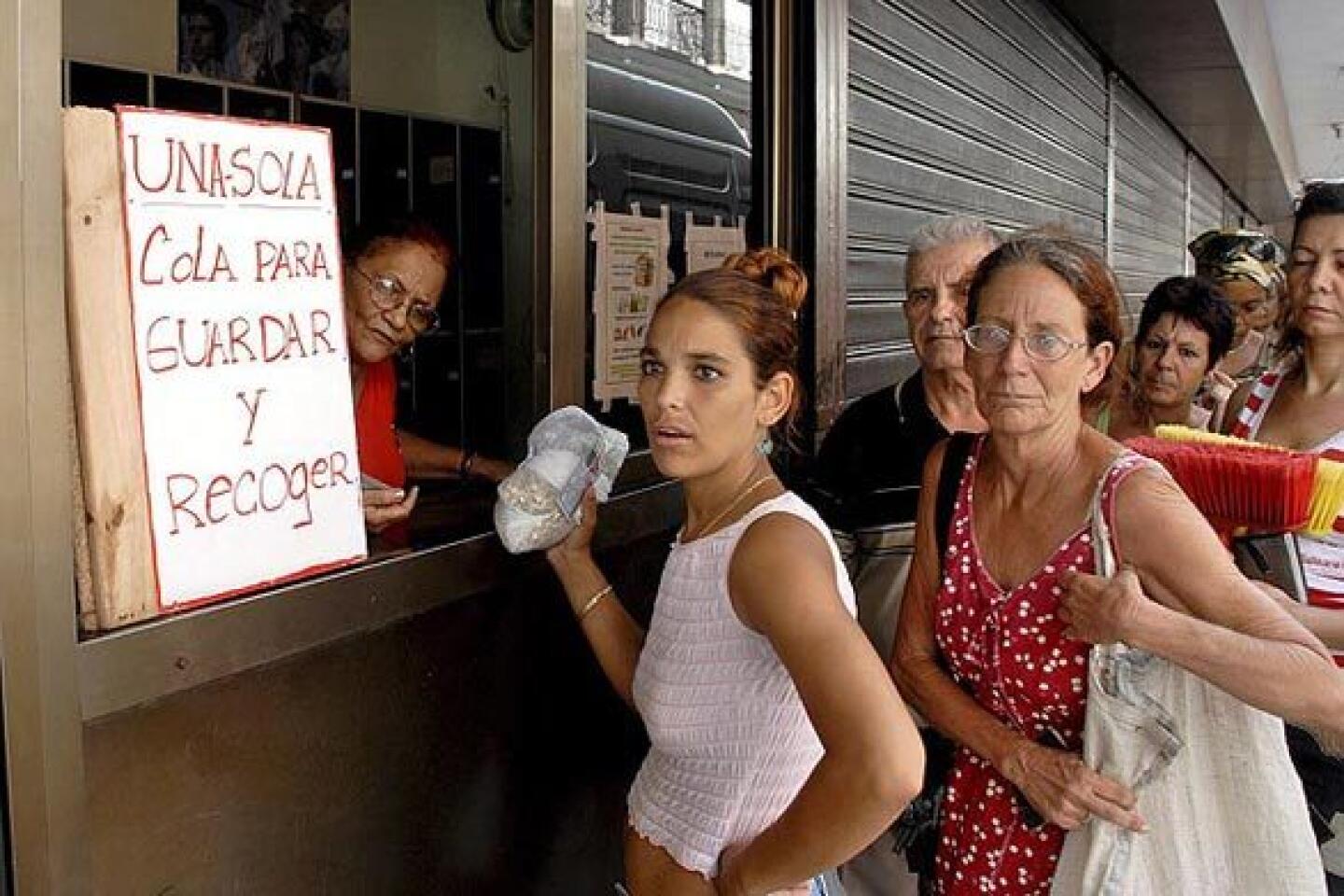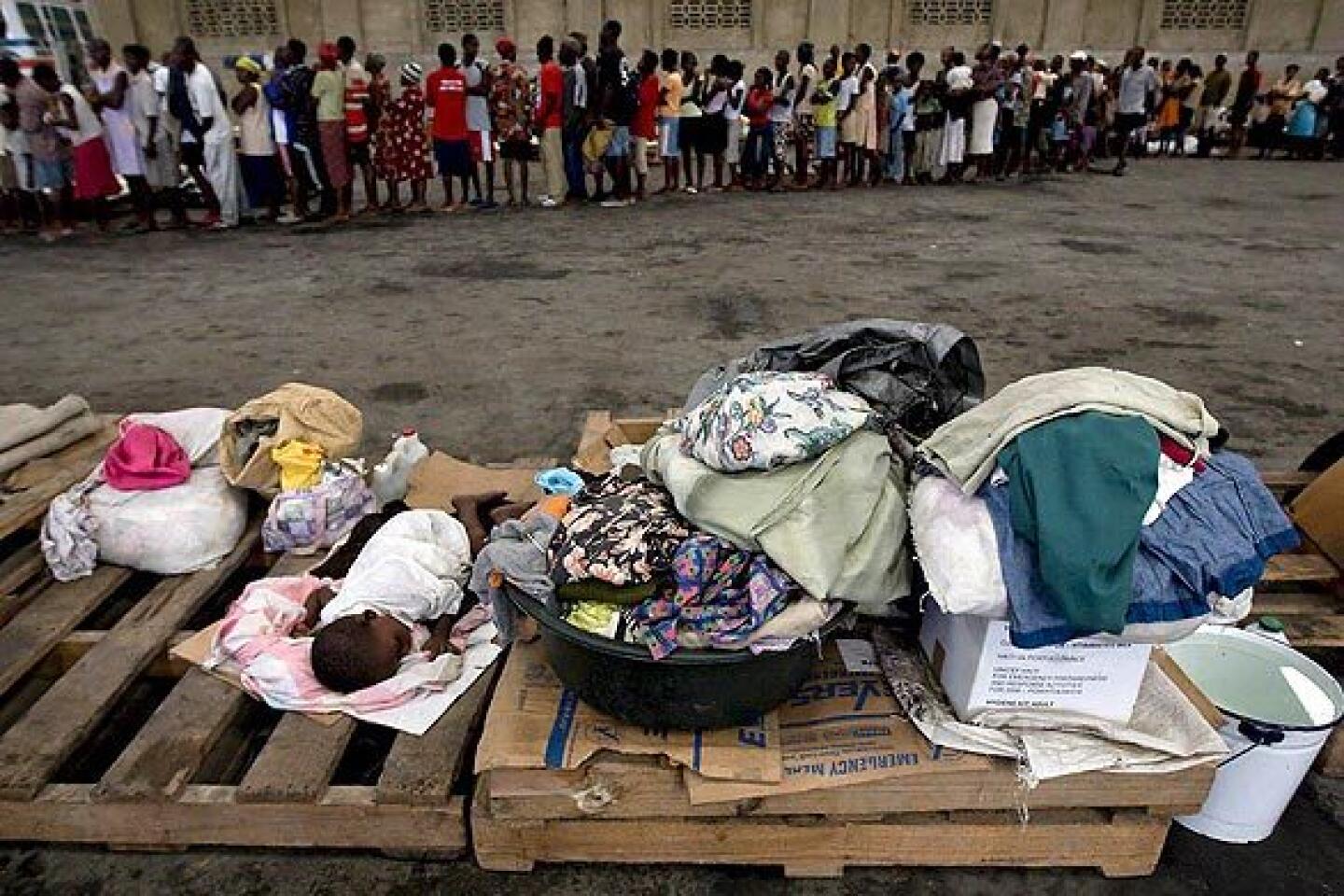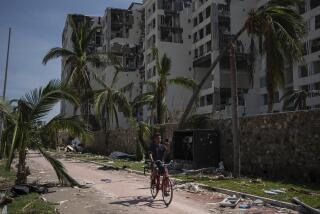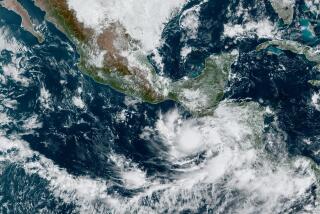Hurricane Ike shreds central Cuba, heads for Havana
Hurricane Ike ripped through central Cuba on Monday, toppling colonial landmarks and forcing the evacuation of nearly 1 million people -- with more likely to be displaced as the powerful storm plowed toward populous Havana.
Revolutionary leader Fidel Castro proclaimed his country on “combat alert” against the third massive storm to hit the island in as many weeks and what he portrayed as a heartless double standard that blocks U.S. humanitarian aid.
The extent of Ike’s damage elsewhere in the Caribbean also emerged Monday, a day after it ravaged the Turks and Caicos Islands and the Bahamas as a Category 4 hurricane with winds upward of 135 mph and triggered more flooding in devastated Haiti, where the death toll from the series of storms was reported to exceed 1,000.
In the important Cuban farming and mining areas near Camaguey, news agencies reported that the ferocious winds toppled buildings, including colonial columns that graced the city, a UNESCO-designated historical site.
Exiting into the Caribbean Sea at midday, Ike slowed to about 12 mph, and the National Hurricane Center reported its sustained winds had subsided to about 80 mph. But the Miami-based center warned that the storm was likely to regain intensity overnight as it moved across the warm waters off Cuba’s southern coast.
Forecasters feared Ike might hit Havana today with winds exceeding 100 mph.
“It will have a very powerful fuel there,” Jose Rubiera, head of Cuba’s Meteorological Institute, warned on state television after Ike crossed into the shallow mangrove-studded waters of the Gulf of Ana Maria.
Haiti’s consul general for South Florida, Ralph Latortue, reported an even more dire state in his homeland than was apparent from the TV images showing bloated, mud-covered bodies stacking up at makeshift morgues along the flooded west coast. More than 1,000 people have been killed over the last month, 14,000 homes have been destroyed and 5 million people are without food or shelter, he told journalists in Miami.
The U.S. Navy sent its amphibious assault ship Kearsarge to Port-au-Prince to assist in ferrying disaster relief to victims cut off by collapsed bridges and flooded towns along the sole road to stricken areas north of the capital. In contrast to the $100,000 in assistance offered Cuba, Washington gave Haitian storm victims $10 million.
Bahamian Prime Minister Hubert Ingraham reported widespread damage to housing and landscape but no casualties in Great Inagua, where Ike hit Sunday. There also were no confirmed casualties in the Turks and Caicos, although a survivor told the Associated Press on Grand Turk that 90% of the tiny island’s structures had been destroyed.
As Ike made its way westward across the 700-mile length of Cuba, it churned up five-story storm surges that blasted seaside towns and villages. Soldiers and civil defense volunteers moved more than 900,000 people from endangered areas inland to schools, hospitals and other fortified buildings. At least 9,000 foreign tourists were among those uprooted, and Cuban media reported that more evacuations had been ordered for the capital. The eye was expected to pass south of Havana this morning.
Evacuations are mandatory in Cuba, a policy the country’s communist rulers say has prevented deaths and injury rampant in countries such as Haiti -- and the United States, in the case of Hurricane Katrina three years ago.
Raul Castro, the former defense minister who took over from his older brother as president in February, spent Monday directing the massive evacuation and public security operations from Havana in a conference call with the leaders of all 14 Cuban provinces, the Communist Party daily Granma reported.
Fidel Castro, 82 and convalescing at a secret location, issued one of his periodic “reflections” praising Cuba’s civil defense efforts and accusing the Bush administration of reveling in Cuba’s sorrows from Ike and the storms that preceded it, Gustav and Hanna.
At least 140,000 homes in Cuba were destroyed by Gustav and Hanna, and preliminary reports from the eastern provinces where Ike first made landfall estimated at least 10,000 more have been toppled or severely damaged.
Fidel Castro warned even before Ike hit that recovery costs would be in the billions for a nation in which the average monthly salary is less than $20.
“The world has admired our people’s conduct under the scourge of Gustav. As our enemies cynically rubbed their hands with glee, our friends, who are obviously not few, are determined to cooperate with our people,” the elder Castro wrote, referring to aid sent by Russia, Vietnam, China and Venezuela.
Hurricane preparedness in Cuba, where there is rarely any loss of life despite the frequent battering, is one of Castro’s proudest achievements. However, state television reported the island’s first deaths of this hurricane season: two men who were removing an antenna, a woman whose house collapsed and a man hit by a falling tree.
It is also a political tool in the hands of the semi-retired revolutionary who deplores the U.S. embargo on his island’s 11.4 million citizens as particularly inhumane in times of natural disasters.
The U.S. government last week expressed regret over the devastation inflicted by Hurricane Gustav and offered to send a disaster assessment team to Cuba. It also offered $100,000 in relief aid. Both were politely rejected.
Democratic presidential nominee Barack Obama suggested in the wake of Gustav that Washington suspend limits on family visits and remittances to Cuba for 90 days, to allow Cuban Americans to help their relatives rebuild.
The State Department has refused to alter its policies on money transfers, which are limited to $100 a month and may be made only to immediate family. Nor has it softened its limitation of family visits to once every three years.
“If the U.S. government has the real will to cooperate with the Cuban people after the hurricane tragedy, it is requested that they suspend restrictions that block U.S. companies from offering private commercial credit,” the Cuban Foreign Ministry said Saturday.
Under the embargo, Cuba must pay up front in cash through third-country banks for any food or medicine imports, which delays arrival.
Secretary of State Condoleezza Rice made it clear Sunday that Washington’s policies won’t change.
“What we can’t do is to have the transfer of power from one dictatorial regime to another,” Rice told journalists during a visit to Morocco, referring to Fidel’s transfer of the leadership to his brother. “That is not acceptable. . . . So I don’t think in the context that we see now, that the lifting of the embargo would be wise.”
Cuban Americans in Florida, whose once-monolithic opposition to cooperation with Cuba has fractured since the Bush administration invoked harsher sanctions, support suspending limits on family visits and remittances, but not the direct trade and lending sought by Havana, said Sandy Acosta Cox, spokeswoman for the Cuban American National Foundation.
Advocates of improving relations panned U.S. policy.
“Our policy is inhumane in the short term and self-defeating in the long term,” said Sarah Stephens, executive director of the Center for Democracy in the Americas. “It’s inhumane to turn our backs on suffering in Cuba when the needs are so acute, and that unwillingness to help sends a powerful message to the Cuban people about who was or wasn’t on their sides when it mattered.”
The U.S. and Cuban governments have a history of spurning each other’s offers of help. Fidel Castro proposed sending more than 1,500 disaster-trained doctors to the U.S. Gulf Coast after Hurricane Katrina, a gesture of sympathy that Washington rejected. Havana, when Fidel Castro was in charge, turned away U.S. offers of $10,000 in immediate disaster aid after hurricanes, calling the sums insulting.
carol.williams@latimes.com
The Associated Press was used in compiling this report.
More to Read
Sign up for The Wild
We’ll help you find the best places to hike, bike and run, as well as the perfect silent spots for meditation and yoga.
You may occasionally receive promotional content from the Los Angeles Times.








